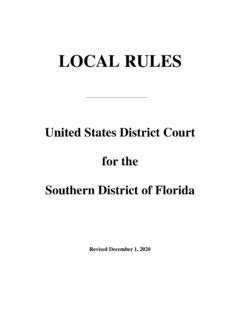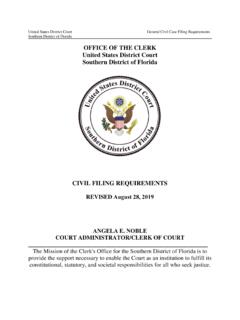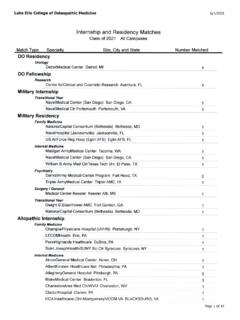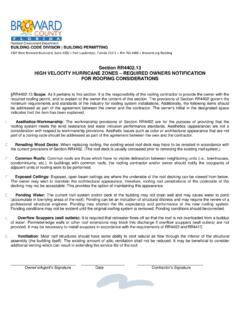Transcription of THE MECHANICS OF FLORIDA CIVIL PROCEDURE
1 THE MECHANICS OF FLORIDA CIVIL PROCEDURE William J. Cook Barker & Cook, 501 East Kennedy Boulevard, Suite 1040 Tampa, FLORIDA 33602 (813) 489-1001 2 RESPONSIVE PLEADINGS WHAT TO USE AND HOW A. TIMING AND AVOIDING DEFAULT A defendant has twenty days from the date of service to respond to a complaint. See Fla. R. Civ. P. (a). More often than not, the defendant retains counsel with little time left to respond, and sometimes after the time to respond has passed. Plaintiff s counsel usually will grant a reasonable time extension upon request, but if not, there are several options. First, Rule (b) provides that a party can move for an enlargement of time for cause shown, and even after the time for responding has elapsed upon a showing of excusable neglect.
2 See Fla. R. Civ. P. (b). The rule, however, does not provide for an automatic extension, and it may be difficult to obtain hearing time before the deadline. Nonetheless, it is wise to file a motion for enlargement of time, stating the reasons for filing it, including counsel s futile efforts to obtain an extension from opposing counsel. The defendant then will have better grounds for setting aside a default if one is entered. Another option, if counsel has a good faith basis, is to file a motion under Rule , as serving a motion tolls the time to answer. See Fla. R. Civ. P. (a)(3). If a default is entered, the court will vacate it upon a showing of excusable neglect, a meritorious defense, and due diligence. See Gibson Trust, Inc. v. Office of the Atty.
3 Gen., 883 379, 382 (Fla. 4th DCA 2004) (citations omitted). FLORIDA courts have a liberal policy of vacating defaults so that cases can be decided on the merits, and clerical errors are usually a sufficient excuse. See Somero v. Hendry General Hospital, 467 1103, 1106 (Fla. 4th DCA 1985) ( [W]here inaction results from clerical or secretarial error, reasonable misunderstanding, a system gone awry or any other of the foibles to which human nature is heir, then upon timely application accompanied by a reasonable and credible explanation the matter should be permitted to be heard on the merits. ). B. MOTIONS According to Rule (b), the following defenses may be made by motion: (1) lack of jurisdiction over the subject matter, (2) lack of jurisdiction over the person, (3) improper venue, (4) insufficiency of process, (5) insufficiency of service of process, 3 (6) failure to state a cause of action, and (7) failure to join indispensable parties.
4 In addition, Rule (d) provides a catch-all for affirmative defenses appearing on the face of a pleading may be raised in a motion to dismiss under Rule (b). Rule (b) requires that the substantial matters of law intended to be argued shall be stated specifically and with particularity. Fla. R. Civ. P. (b). In other words, a motion simply stating that a complaint fails to state a cause of action likely will not be sufficient. See, , Liton Lighting v. Platinum Television Group, Inc., 2 So. 3d 366, 367 (Fla. 4th DCA 2008) (trial judge may not dismiss a cause of action on grounds not pleaded because the claim is being dismissed without notice and the opportunity to be heard). A motion to dismiss for failure to state a cause of action pursuant to Rule (b)(6), tests the legal sufficiency of the complaint s allegations and its compliance with the pleading standards in Rules ( short and plain statement of ultimate facts ) and (special matters).
5 The movant has a heavy burden. In ruling on a motion to dismiss for failure to state a cause of action, the trial court must consider only the four corners of the complaint and must assume that all allegations in the complaint are true. See Carmona v. McKinley, Ittersagen, Gunderson & Berntsson, , 952 So. 2d 1273, 1275 (Fla. 2d DCA 2007) (citations omitted). Moreover, under the FLORIDA rule, all reasonable inferences must be construed in favor of the non-moving party, and a complaint should not be dismissed unless the movant can establish beyond any doubt that the claimant could prove no set of facts whatever in support of his claim. See Meadows Cmty. Ass'n, Inc. v. Russell-Tutty, 928 So. 2d 1276, 1280 (Fla. 2d DCA 2006). If a defendant raises an affirmative defense in a motion to dismiss, the defense must appear on the face of the complaint.
6 See Fla. R. Civ. P. (d). The plaintiff does not have the burden of anticipating a defense and then overcoming it in his initial pleading. See Legrande v. Emmanuel, 889 So. 2d 991 (Fla. 3d DCA 2004). Statute of limitations is one example of an affirmative defense that sometimes is raised in a motion to dismiss. See Aquatic Plant Mgmt., Inc. v. Paramount Eng'g, Inc., 977 600, 604 (Fla. 4th DCA 2007). If the trial court grants a motion to dismiss, the plaintiff ordinarily must be given leave to amend the complaint. See Trotter v. Ford Motor Credit Co., 868 So. 2d 593 (Fla. 2d DCA 2004). Indeed, a plaintiff has an absolute right to amend once before a responsive pleading is filed. A motion to dismiss is not a responsive pleading, and so a plaintiff can amend an initial 4 complaint at any point prior to the trial court s ruling on a motion to dismiss.
7 A judge's discretion to deny amendment of a complaint arises only after the defendant files an answer or if the plaintiff already has exercised the right to amend once. Boca Burger, Inc. v. Forum, 912 So. 2d 561, 567 (Fla. 2005). The federal standard for dismissal is less stringent for the defendant as a result of the Supreme Court s decisions in Bell Atl. Corp. v. Twombly, 550 544 (2007) and Ashcroft v. Iqbal, 129 1937 (2009). To survive a motion to dismiss in federal court, a complaint must contain sufficient factual matter, accepted as true, to state a claim to relief that is plausible on its face. See Twombly, 550 at 570. There is no mechanism in the rules for dismissing separate counts of a complaint. As discussed above, service of a motion to dismiss tolls the time to respond to the complaint.
8 See Fla. R. Civ. P. (a)(3). If a defendant wishes to seek dismissal of some but not all of the counts, the defendant need not answer to unchallenged counts when filing a motion to dismiss. If the motion is successful, the entire complaint is dismissed with leave to amend. If the motion is unsuccessful, the defendant has ten days to answer. See Fla. R. Civ. P. (a)(3). The closest thing to a partial motion to dismiss is a motion to strike pursuant to Rule (f), which permits a trial court to strike redundant, immaterial, impertinent, or scandalous matter from any pleading. Fla. R. Civ. P. (f). The standard is different from a motion to dismiss, however, as the court must find that the material is wholly irrelevant, can have no bearing on the equities and no influence on the decision.
9 See Rice-Lamar v. City of fort lauderdale , 853 1125, 1133-34 (Fla. 4th DCA 2003)(citing McWhirter, Reeves, McGothlin, Davidson, Rief & Bakas, v. Weiss, 704 214, 216 (Fla. 2d DCA 1998)). The rule often is invoked when the defendant feels that the plaintiff has inserted unnecessary allegations in an attempt to create publicity or embarrass the defendant. C. ANSWER AND AFFIRMATIVE DEFENSES Rule sets forth the pleading rules for both complaints and answers. An answer must admit or deny the plaintiff s allegations, and if the defendant is without knowledge, the defendant shall so state and such statement shall operate as a denial. The denial must fairly meet the substance of the allegation. Fla. R. Civ. P. (c). Allegations that are not denied are deemed admitted.
10 Fla. Rule Civ. P. (e). Rule (d) contains a laundry list of specific affirmative defenses that must be pled, 5 along with the catch-all any other matter constituting an avoidance or affirmative defense. Fla. R. Civ. P. (d). A defendant may raise alternative and inconsistent defenses. Fla. R. Civ. P. (g). Sometimes it is difficult to determine what constitutes an affirmative defense, as opposed to a denial. Affirmative defenses do not deny facts. They raise some new matter that defeats the plaintiff s claim. See Tropical Exterminators, Inc. v. Murray, 171 So. 2d 432 (Fla. 2d DCA 1965). Affirmative defenses are subject to the same pleading rules as the complaint. A motion to strike a defense tests the legal sufficiency of the defense. See Burns v.







